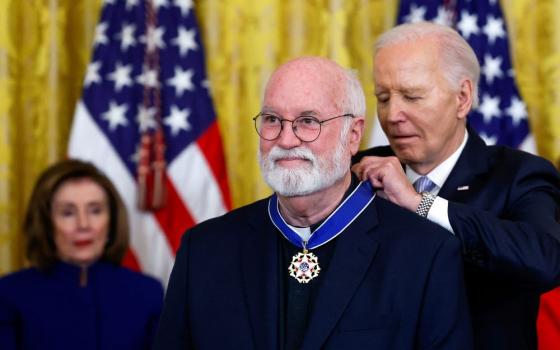LIT: A MEMOIR
By Mary Karr
Published by HarperCollins, $25.99
Written with wit and memorable lines, Mary Karr’s Lit offers a searing self-portrait of a woman struggling with the demons inside herself. As she faces down her own dependency on alcohol, her self-doubt and recklessness, she slowly comes to discover the power of prayer and a new relationship with what she calls her H.P., or Higher Power.
For NCR readers, Karr’s conversion story might be the book’s most engaging element. With a relentless pull as powerful as drink itself, God summons. Karr is a reluctant, skeptical listener. She mocks the advice given that just to fall to her knees will help with the darkest night of the soul, but then she lowers herself down to pray in the swank bathroom stall of a fancy restaurant where she’s the only one not drinking. She kneels again on the cold tiles of the hospital ward when she finally surrenders, realizing, she says, that by checking herself in to the hospital, “I’ve said in some deep way uncle, or -- as they said in my old neighborhood -- calf rope -- referring to an animal hogtied in a rodeo arena. I’ve stopped figuring so hard and begun to wait, sometimes with increasing hope, to be shown.”
As Karr begins to pull herself out from a dark spiral of drinking bouts on the front steps while her infant son sleeps inside, or nearly driving herself off the road, she learns to lean on others. She becomes a living testimony to the adage, “In weakness, there is strength.”
One by one, people enter her life to provide mittens for cold hands, a listening ear, compassionate tough-love advice, or a contract for her first memoir, The Liar’s Club. These people are Karr’s guardian angels, though she never calls them that. There’s the persistent sobriety partner, Joan, who insists that Karr turn herself over to God: “The only way I know to arrive at balance in my choices is through prayer.” Then, a young female intern at the hospital, who tells her, “You might find sober people who don’t pray but all the happy ones have some kind of regular meditative or spiritual practice” -- and when that isn’t convincing, “Drinking is like the butcher knife. You have to put it down before you can let God in.”
There’s the compassionate intake nurse on the suicide ward who gives her herbal tea and says her name is also Mary, and the Alcoholics Anonymous member Jake who offers a hilarious warning of how close the brink remains when he quips: “I have an allergy to alcohol. When I drink it, I break out in handcuffs.”
 One of her strongest angels is the writer Tobias Wolff, whose literary support and friendship sustains and rescues her: “For the unbeliever I am, Toby’s wave in my direction is incalculable shithouse luck. (I’d later call it grace.)”
One of her strongest angels is the writer Tobias Wolff, whose literary support and friendship sustains and rescues her: “For the unbeliever I am, Toby’s wave in my direction is incalculable shithouse luck. (I’d later call it grace.)”
With accelerated pace, the book moves into the story of Karr’s blossoming faith, her Gospel chats with Toby, her evening ritual of singing her son to sleep with the Prayer of St. Francis, and her conversion to Catholicism. But this is a reluctant and wry narrator. She titles one chapter “God Shopping,” and launches it with a disavowal: “If you’d told me even a year before I started taking Dev to church regular ... that I’d wind up whispering my sins in the confessional or on my knees saying the rosary, I would’ve laughed myself cockeyed. More likely pastime? Pole dancer. International spy. Drug mule. Assassin.”
Yet perhaps it is this cynical, caustic, even at times crass voice that makes Lit so unforgettable, so painfully raw, and so real. Lit is the story of Karr’s emergence as a writer, and for that it’s a fantastic account of a self-doubting poet finding her way. But it’s also an account of being lit up, first by the dark oblivion of alcohol and then, almost miraculously, by the fire of God, “holding me when I’m scared -- the invisible hands I mocked years before.”
Karr herself explained in an interview that the book “is about getting drunk and getting sober. It’s about what I like to call my nervous breakthrough. It’s about leaving home to find home; embracing a mother to let a mother go and become a mother yourself; it’s about all the help I had along the way.”
Written with a fierce questioning that borders on irreverence, Karr’s book allows readers to journey with her as she passes from dark to light and, in the process, perhaps she becomes a vessel for her readers since this narrative, to use the words of her most spiritual chapter, “Makes a Body Wonder.”
[Alyssa J. O’Brien is a lecturer at Stanford University. She has published or coauthored seven books on writing. She teaches courses in visual rhetoric, cross-cultural communication, and creative writing.]







